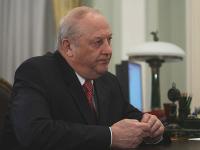 |
|
|
|
Mr Rossel Corners Sverdlovsk Oblast
26.06.2009 — Analysis Eduard Rossel, Governor of the Sverdlovsk Oblast, has addressed the Legislative Assembly delegates with the 2010 budget message. His speech conveyed two key messages: jobs must be saved and financial discipline strengthened by cutting tax concessions and payment of wages "in the envelope". Experts say that these two tasks hardly fit together.
The leader of the region made it clear that he will support the industries at any price, including violation of law. For instance, he ordered the police department in one of the oblast's cities to deny access for the insolvency administrator to a plant that was facing bankruptcy. To pay the company's debts the administrator started selling the machines. This is how the Governor explained his arbitrary decision: after the machinery is sold, the plant will cease to exist, and the plant means jobs. Eduard Rossel also told the industrialists that he agreed with the head of Vnesheconombank Vladimir Dmitriev on a 10 billion euro credit limit for the real sector of the economy. Combined with 1 billion dollars to be provided by China, this will solve the problem of financing industrial projects, according to the Governor. Meanwhile, the Governor emphasized that he would deal with ineffective owners of the enterprises who hold back wages or pay it ‘in envelopes', as well as with those who are unwilling to bear responsibility for job placements. Any delay in the payment of wages will be scrutinized by fiscal authorities. Eduard Rossel approves of pre-revolutionary laws, according to which an enterprise was to be managed by the state in case of solvency issues. The managers who will optimize costs 'in a wrong way' will be prosecuted. In addition, the regional industrialists have to accept that there will be no more tax concessions from now on and the budget payments for state and municipal orders will decrease. The governor decided to conduct the most part of bidding electronically, which helps cut the cost of the order considerably. Having listened to the leader of the region, Director General of MK Uralmash Nazim Efendiev diplomatically reminded the Governor that the analysts anticipate the second wave of crisis, which means a further drop in demand for goods and industrial products, while the banks still offer loans at 16-20%. In fact, he meant to ask whether the authorities understand that the drop in orders will not only fail to help in saving the jobs, but will make tax payments impossible. The Governor did understand it. He told Efendiev, "You surely know the answer to your question". Rossel is of the opinion that the economy hasn't yet reached its lowest point. He thinks that the real problems will start this autumn and in the beginning of the winter of 2010. "Instead of developing technology, we've been mechanically exploiting the price growth for raw materials, and when the bubble burst we were not prepared to face the new reality", said the Governor. The Governor confessed that he didn't have the faintest idea of where the interest on loans comes from. That's why he suggested that the industrialists turn to Chinese investments. Industrialists, in their turn, didn't think much of this suggestion because in lobbying its own industry China offers only tied loans, which involve purchasing Chinese machinery. This type of investment can hardly save the machine building enterprises. Experts are of the opinion that in trying to save jobs and at the same time not to reduce social expenditures the region is cornering itself. The chairman of the Industrial Committee of the regional Duma Vladimir Mashkov thinks that it would be extremely difficult to make 2010 budget similar to the 2009 one. Municipal budget losses are not too big (around 5-7%), but the regional budget faces much more severe problems. Its major source is the profit tax and individual income tax, which means that the budget is totally dependent on the volume of orders that the industrial enterprises have. The latter officially declared at the anti-crisis office meeting that they have no profit whatsoever and the only task the companies face is to survive. Vladimir Mashkov said, "I think it is necessary to develop such projects as The Industrial Urals - The Polar Urals, so that the government placed orders with metal producers, in construction and other sectors." In addition, Mr Mashkov thinks that it is important to deal with the government property. Only 2-3% of land is being actively used in Russia, the rest is either not used at all or used illegally by criminal groups. Intellectual property doesn't yield anything either, because over 90% of all inventions and ideas are either shelved or being transferred abroad ‘alive', so to say, i.e. in the heads of the scientists who found jobs abroad. These are our reserves that lie on the surface; we only need to set everything right, including the law. Rinat Sadriev, a businessman who became a Duma deputy, can hardly believe that the government will be able to sort the situation out quickly enough. That's why he is convinced that 2010 will be a tough year, because "so far we've been living at the cost of the previous year budget. Next year we won't have any ‘fat' to live on. Funding will drop, jobs will be cut and industry will stagnate. The least protected population groups will have the hardest time. We have to get ready for this." Vladimir Terletsky |
| Regions | Project participants | Investment projects | Consulates and Trade Offices | News and Analysis | About the Project |
|
© RusBusinessNews, 2009. All rights reserved. Establishing a hyperlink to RIA RusBusinessNews is required for using any of the material published on this website. News and analytical reviews are translated into foreign languages by the TRANSLIT Translation Agency |
«Sum of technologies»® Web design Site promotion |